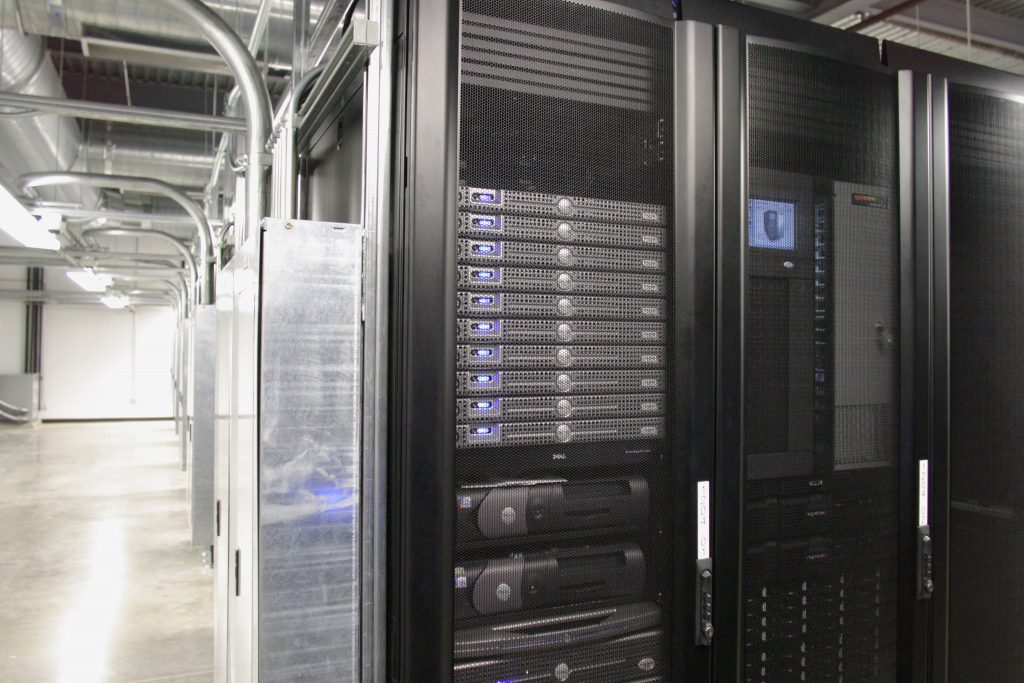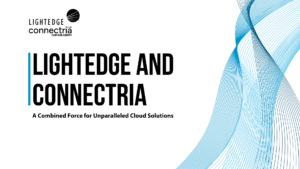Colocation or colocation hosting is where you rent space for your IT hardware at a 3rd party provider’s data center facility. Using colocation services can deliver advantages for your business that you may not realize using or building out your own data center facility. In this article, I take a deep dive into what colocation is, how it works, pros & cons, and how to select a colocation provider. Continue reading to see if colocation is right for your organization.
What is colocation?
Colocation or colocation hosting is a highly secure data center facility where equipment, servers, space, and bandwidth are available for purchase to businesses. Colocation is a data center facility that companies can buy space in to host their servers and experience higher security and guaranteed uptime. Most companies are not in the business of owning and operating data centers, so they use a colocation facility to store their company’s critical infrastructure.
Businesses that use a colocation hosting service get to take advantage of their provider’s:
- Lower power and bandwidth costs
- High-speed and redundant 24/7 network connection
- Physical data center security measures
- Compliance certifications and badges
- Long-term stability, flexibility, and scalability
- Expert technical support
Typically, colocation hosting improves business operation uptime, cuts capital costs, and boosts the quality of service that customers experience. Colocation can take the customer’s existing server infrastructure and move it from their office or on-premises environment to the colocation provider’s data center.
Using colocation hosting allows organizations to focus exclusively on managing their own operations and meeting goals while lowering their IT budget.
How Colocation Hosting Works
A colocation facility provides customers with a physical building and white floor space, cooling, power, bandwidth, and security. The customer then provides their organization’s servers. Space in the facility is typically leased by the rack, cabinet, cage, or private suite. Some colocation providers even offer managed storage services to support an organization’s business initiatives.
When a business moves into a colocation facility, the provider must ensure there is the proper amount of space inside the rack, along with power for the equipment, IP addresses, and uplink ports to ensure the equipment is connected to the network.

The colocation provider should be staffed around the clock to provide IT support upon request. The colocation provider is responsible for the upkeep and security of their facility. They ensure the power and cooling is redundant, so outages are not experienced.
A company that is using colocation can have their equipment located in multiple data centers, if desired. This would be useful for companies that have a larger geographic footprint and want to make sure their computer systems are located near their physical office space. LightEdge has seven data center colocation facilities across Des Moines, Kansas City, Omaha, Austin, and Raleigh to provide just that.
Choosing A Colocation Provider
Like all IT services, there are many different options for colocation providers, and each bring something different to the table. The United States and Canada are leading the way in colocation hosting. According to Quotecolo, currently “43 percent of the world’s operational space for colocation is in North America.”
It is important to make business priorities clear when vetting different providers. If 100 percent uptime and redundancy is at the top of the list, closely examine the colocation provider’s service level agreement (SLA).
If compliance and security are top priorities, request to see the provider’s compliance certifications given to them by third-party auditors. It is also important to take inventory of the physical security. Does this colocation facility have geographic stability? Is it natural disaster and man-made harm proof? Does it have the latest security technology installed, including security cameras, multi-factor authentication, and secure check-in processes? Make a point to validate that these features are in place.
While amenities may not be a make or break deal, vetting the different amenities that a colocation provider brings to the table can help make the decision between one or another. Things like always-available technical expertise and building amenities like conference rooms, access to phones, printers, and other office equipment never hurt. These additions could come in handy when staff would need to work out of the data center.
Data centers operate on a tiered basis, and the higher the tier is, the better the data center appears to be. In colocation hosting terms, a tier IV data center is the most powerful, while a tier I data center offers the least capacity. The norm for most leading colocation services providers and the level you should strive to tap into is Tier III. Start vetting colocation providers that hit the checkboxes of Tier III and beyond to meet business needs.
If you’re considering a new colocation provider or data center, check out our 10 critical questions to ask your colocation provider.
Benefits of Colocation
There are several reasons a business might decide to use colocation over building its own data center. The main drivers are typically capital expenditures associated with building, maintaining, and updating a large computing facility.
Some world-class colocation facilities offer disaster recovery and business continuity services, as well. Without a business continuity or disaster recovery plan in place, you’re risking mission-critical systems, applications, and irreplaceable data. Aside from the threat of natural disasters, common mishaps like equipment failure can put a halt to operations and damage your reputation.
A colocation provider that also offers disaster recovery and business continuity services can ensure uninterrupted performance of IT operations and mission-critical systems in the event of a disaster. Other features of colocation that benefit businesses include:
- Designed for high-density cloud computing environments
- Backed by 24/7/365 remote hands technical support for tactical response
- Interconnected with an advanced network backbone to serve next-gen computing requirements
- Scalable to help customers future-proof their business
- Highly trained and industry-certified techs diagnose, isolate, troubleshoot and resolve issues in a highly controlled manner
- Facilities meet compliance standards for HIPAA, PCI, HITRUST, SOC 1, SOC 2, and SOC 3, etc.
According to the report done by the Colocation Data Center Industry: Global Markets to 2020 “the data center and colocation market is expected to be worth $54.8 billion by 2020. That figure is well up from $30.9 billion in 2016.”
Downsides to Consider
While colocation seems like the best choice, there can be downsides to consider. Distance between the data center colocation facility and a customer’s office can translate into increased travel costs when equipment needs to be touched manually.
Some colocation providers, like LightEdge, own and operate multiple colocation facilities all over the country to ensure that distance is not an issue.
Uptime is another issue to consider. If a colocation provider does not have access to multiple network carriers or have multiple data centers to ensure a redundant connection 100 percent of the time, then the customer may experience serious outages. In a survey by CA Technologies of 200 companies, more than $26.5 billion in revenue is lost each year from system downtime. At the most recent estimates, an unplanned data center outage costs companies more than $7,900 per minute, and the cost continues to rise.
Ensure that uptime and recovery are identified in the colocation provider’s SLA, so unexpected outages do not occur. It is also important to closely examine the SLA for any hidden charges, as well.
Pros & Cons of Colocation
While the benefits of colocation outweigh the downsides, they’re still important considerations when deciding if it’s the right solution for you. Here are some of the pros and cons of outsourcing your data hosting to a colocation center:
Pros
- Cost-effective by allowing businesses to save on initial infrastructure investment
- Optimal redundancy and reduced downtime
- Better security by leveraging provider’s up-to-date protocols in both physical infrastructure and cybersecurity
- Designed for high-density cloud computing environments
- Backed by 24/7/365 remote hands technical support for tactical response
- Interconnected with an advanced network backbone to serve next-gen computing requirements
- Scalable to help customers future-proof their business
- Highly trained and industry-certified techs diagnose, isolate, troubleshoot and resolve issues in a highly controlled manner
- Facilities meet compliance standards for HIPAA, PCI, HITRUST, SOC 1, SOC 2, and SOC 3, etc.
- Safeguards mission-critical systems and data offsite, making colocation a great choice for disaster recovery and business continuity planning
Cons
- Distance between the data center colocation facility and a customer’s office can translate into increased travel costs when equipment needs to be touched manually.
- Some colocation providers, like LightEdge, own and operate multiple colocation facilities all over the country to ensure that distance is not an issue.
- Uptime is another issue to consider. If a colocation provider does not have access to multiple network carriers or have multiple data centers to ensure a redundant connection 100 percent of the time, then the customer may experience serious outages.
- Ensure that uptime and recovery are identified in the colocation provider’s SLA, so unexpected outages do not occur.
Rack, Cage, or Private Suite
When renting space within a colocation facility, there are typically three different options for storing equipment. Selecting a storage options depends on the organization’s size, budget, and its compliance and security preferences.
A colocation server rack is a cabinet that is located in the white floor space in the data center room. This cabinet has a lock and is located in an aisle alongside other colocation server racks. A company may only need one rack or may use up many. Racks are typically the lowest cost of the three storage options.
The next storage option is a cage. A cage is just what it sounds like. The colocation provider adds a cage around the customer’s data center racks to add another layer of security. The cages are also located in the white floor space of the data center among the other data center racks, but the cage provides a larger space that only the customer can enter. This option is great for companies that require a higher level of security or must comply with certain regulations.
The last storage option is a private suite. Top tier colocation facilities, like LightEdge, offer the highest level of security to customers through a private suite option. A private colocation suite is a fully customizable deployment service, which offers companies autonomy and control of their IT requirements.
A private colocation suite is enclosed for maximum security. Only the authorized employees of the company that has bought a private suite would be able to access this area. It would require a special ID badge and other multi-factor authentication measures. An enclosed floor to ceiling private suite ensures that the business has dedicated and confined power and cooling. A private colocation suite would be best for heavily regulated industries such as healthcare, banking, manufacturing, government, and education.
Let LightEdge Be your Colocation Provider
Finding a colocation provider that meets the security, network availability, scalability, and support that your organization requires may seem daunting. Thankfully, LightEdge is top-performing in each of those categories, but don’t take our word for it. Take a virtual tour through one of LightEdge’s seven data center colocation facilities with the hosts of Off the Cuf to see our world’s most secure data center.
Customers turn to LightEdge to reduce the risk of non-compliance, scale security, and for our proven predictability and cost-effectiveness. LightEdge provides customers with an extended team of experienced engineers, so you can refocus internal resources on agility, differentiation, and running towards achieving your desired business outcomes. Are you curious about how your current provider stacks up? Our security experts will provide a free security assessment to see how you measure up against the latest compliance and security standards. No risk, no commitment. Contact us today to get your free security assessment.
Related Posts:
- 6 Important Considerations For Choosing A Secure Colocation Provider
- Des Moines’s Newest Cash Crop: Data Centers
- Debunking Underground Data Center Misconceptions
- 5 Reasons Your Growing Business Needs Compliant Colocation
- The Best of Both Worlds: Colocation and PCI DSS Compliance
- Data Center Design: Compliance, Location and Regulations
- Data Center Security: Why Providers Should Build Security into Every Detail
- What to Look for in HIPAA Compliant Hosting
- Data Center Checklist: 5 Factors for Choosing a Data Center




